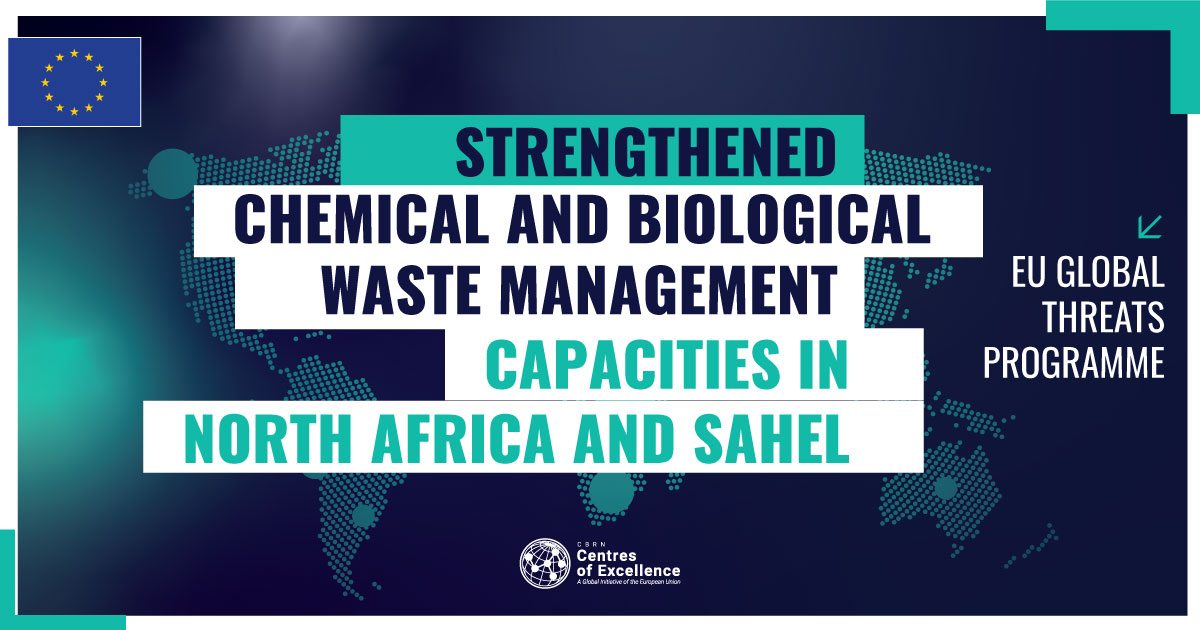
Context
The appropriate management of dangerous chemical and biological waste is important to avoid mishandling or misuse of such hazardous materials, with can have a very negative impact on people (contamination), environment (pollution) or security (thefts, criminal activities, sabotage, proliferation).
Incidents involving hazardous CBRN contaminants can create significant challenges, such as minimising the amount of waste generated during clean up and remediation, segregating waste types, safe packaging and transportation of the waste, and treating and disposing of waste and debris.
Furthermore, in some countries, these waste management complexities are compounded by a lack of expertise, capacity and resources for the disposal and treatment of CBRNE contaminated waste; the lack of experience among decision-makers and the absence of waste management facilities to handle these wastes; the reluctance of some disposal facilities to accept such waste; and limited resources to cover the (sometimes high) costs of disposing of hazardous waste.
Overall objective
This project aims to buildcapacity on hazardous waste management in countries of the North Africa and Sahel region, with a focus on countries that have not yet benefited from similar capacity-building activities, including a few countries in the African Atlantic Façade region.
Specific objectives
- To transfer international and interregional best practices for the management of biological and chemical wastes irrespective of their origins (human, animal, agricultural, environmental) in accordance with international and interregional regulations.
- To train a multidisciplinary network of trainers (on the basis of training of trainers) in the professions and disciplines concerned by the management of biological and chemical risks taking into consideration best practices inherent to this type of waste.
- To strengthen the capacity of the control institutions of each partner country to detect suspect shipments of hazardous waste and take appropriate action following detection.
- To develop common practices in the region for the management of biological and chemical waste, according to international regulations, standards and recommendations.
Concrete activities
- Assessment of national waste management systems and laboratory capacities in each partner country.
- Development of an information management system for hazardous bio-chemical waste.
- Training on risk assessment, management, and technical specifications for waste treatment tools (incinerators, autoclaves, decontamination).
- National capacity-building for analysis of toxic Carcinogenic, Mutagenic and Reprotoxic (CMR) substances for environmental and health risk assessments.
- Feasibility studies on hazardous waste treatment, circular economy approaches, and investment optimisation.
- Technical support across the full waste management chain (sorting to disposal).
- Enhancement of traceability, detection, and control of hazardous waste, including illegal trafficking response measures.
- Organisation of regional table-top exercise on illicit chemical and biological waste trafficking
Expected results
- Inventories of each partner country containing the specificcapacities and needs, including waste collection, recycling and disposal enterprises and facilities as well as accredited laboratories, are set up.
- Curriculum, training objectives and training evaluation for each training are developed.
- Guides on the elaboration of technical specification for incinerators and autoclaves for successful procurement, as well as on proper maintenance of incinerators and autoclaves, are developed.
- National laboratories responsible for analysing toxic substances classified as CMR have adopted protocols to carry out environmental quality monitoring programs as part of Health and Environmental Risk Assessments (HERA) related to hazardous chemical waste.
- Feasibility studies on platform for the collection, storage and transport of hazardous waste are being conducted to boost waste circular economy. For hazardous waste, economic optimisation of treatment facilities investments is conducted.
- Exercise documentation (handbook, report) related to illicit trafficking of hazardous waste are developed.
Achievements
- 6 national assessments on hazardous waste management in partner and associated countries have been conducted.
- 1 regional training workshop on risk management related to hazardous waste has been delivered.
- 4 trainings sessions in risk management of hazardous waste have been delivered to Algeria, Nigeria, Burkina Faso and Cameroon.
- 4 national laboratories have been assessed in the analysis of toxic substances classified as CMR in Burkina Faso.
- 1 training session on elaboration of incinerators and autoclaves technical specifications for procurement process has been delivered in Algeria, while preparations for training sessions in Burkina Faso and Nigeria are on-going (planned for end of June).
- Project duration
- 1 Nov 2023 - 1 Dec 2026
- Project locations
- AlgeriaBeninBurkina FasoCameroonNigeriaSierra Leone
- Overall budget
- €3 500 000
- Threat area
- CBRN Risk Mitigation
